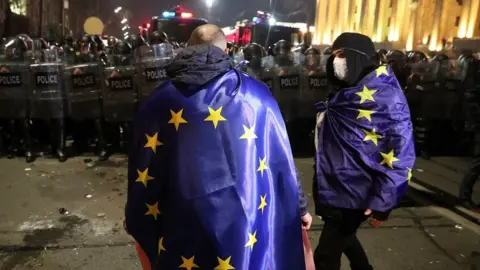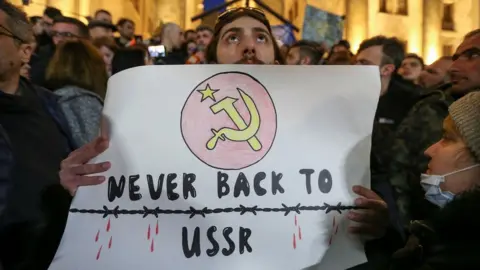Georgia protests: Police push protesters back from parliament
Police have used water cannon and tear gas against protesters in Georgia's capital, Tbilisi, for a second night.
The crowds are angry at a controversial Russian-style law, which would class non-government and media groups as "foreign agents" if they receive more than 20% of their funds from abroad.
On Wednesday evening, police pushed back protesters who pulled down a metal barrier outside parliament.
The crowds were ordered to disperse and some people have been injured.
Pictures from Georgian TV showed hundreds of riot police on the streets late on Wednesday night, wearing helmets and holding shields. At least one police car had been overturned.
Clouds of tear gas rose above the streets around the parliament building as police tried to break up the protests.
Earlier, tens of thousands of people joined the second day of protests.
They took place outside parliament, where on Tuesday lawmakers backed a first reading of the controversial new law, which has been widely condemned internationally.
A similar law in Russia has been used to severely limit press freedom and suppress civil society.
"We think that our government is under Russian influence and it's very bad for our future," said Lizzie, one of many students taking part in the protests.
The protesters worry that the new law, if passed, would damage the country's hopes of joining the EU.
"People are really angry because this is not about one specific thing, it's about the future of Georgia and it's about how we'll function as a country," another demonstrator named Tekla Tevdorashvili told the BBC.
"Everyone is really against this and I think that's why they're so afraid and that's why the government is trying to use everything that they can against the people to silence us but we will not be silenced."
In a statement, the US expressed solidarity with the protesters and called on Georgia's government to allow peaceful demonstrations.
"We urge the government of Georgia to respect the freedom of peaceful assembly and peaceful protests," state department spokesman Ned Price told reporters. "We are standing with the people of Georgia and the aspirations that they have."
Ukraine's President, Volodymyr Zelensky, also expressed his support for the Georgian people.
Authorities said 55 police were hurt during the first night of protests, when stones and petrol bombs were thrown at them. Some of the most arresting images of Tuesday night came when a water cannon was sprayed at protesters waving EU flags.
Prime Minister Irakli Gharibashvili denounced the "stir" over the draft law, which went through its first reading inside parliament on Tuesday. Ruling party Georgian Dream maintains the legislation dates back to US legislation in the 1930s. The same argument was used by Russia after it passed a similar law in 2012.
Russia's law has since been expanded to suppress Western-funded NGOs, independent media, journalists and bloggers. Anyone identified as a foreign agent now has to highlight a foreign-agent label on their publication.
Opposition-supporting TV stations have also dubbed the proposed legislation as a "Russian law".
Georgia has applied to the European Union for candidate status and also aims to join Nato, but EU foreign policy chief Josep Borrell warned that the bill was "incompatible with EU values and standards".
Another student, Lia Chagovadze, said she and her friends were there to fight for Western values and freedom, while Nanuka Shakinovi said the protesters would not allow the government to stop Georgia's push to join the EU: "We are going to fight them and we will not stop until we win."
"Again and again they are trying everything to take us far away from the European Union, European values," said 30-year-old Luka Kimeridze.
Georgian Dream chairman Irakli Kobakhidze said criticism of the draft law as similar to Russia's own repressive legislation was misleading. "In the end, the stir will die out and the public will have transparency in the funding of NGOs," he said.
However, Eka Gigauri of Transparency International told the BBC that NGOs were already subject to 10 different laws and the finance ministry already had full access to accounts, funding and other information.
Political tensions in Georgia have been heightened by Russia's full-scale invasion of Ukraine, seen by many Georgians as a war of aggression by Moscow, and many thousands of Russians have fled there. However, the government in Tbilisi has adopted a neutral stance, refusing to openly back Ukraine or impose sanctions on Russia.
Speaking via video during a visit to New York, Georgian President Salome Zourabichvili voiced her support for the protesters: "I am by your side. Today you represent free Georgia. Georgia, which sees its future in Europe, will not allow anyone to take away this future."
She has vowed to veto the legislation, but Georgian Dream has enough votes to override the president's veto in parliament. The party has applied to the Council of Europe for its opinion.
Passing the law would see Georgia join a list of undemocratic and authoritarian post-Soviet states such as Belarus, Tajikistan and Azerbaijan which have copied the Russian law on restricting the activities of NGOs.
Historically, the term "agent" in Russia and Georgia has the meaning of "spy" and "traitor", giving a negative connotation to the work done by civil society. It suggests they are acting in the interest of foreign forces rather than doing good for the country and society.

Georgia and Russia: The basics
- Pulled between the West and Russia: Georgia has sought to join Nato and the EU, but critics accuse current ruling party Georgian Dream of trying to return the country to Russia's influence
- Georgia was invaded by Russia in 2008: It came 17 years after it gained independence from the Soviet Union, an alliance of communist states that broke apart in 1991
- Russian forces occupy two breakaway regions of Georgia: South Ossetia and Abkhazia make up about 20% of Georgian territory

 Reuters
Reuters Reuters
Reuters